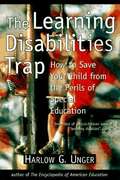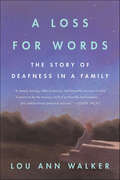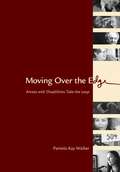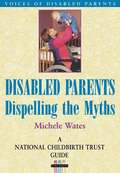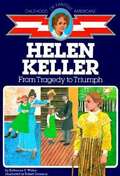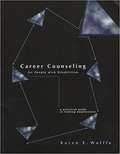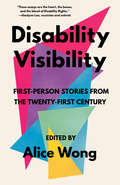Special Collections
Disability Collection
Description: Bookshare is pleased to offer a collection focused on the topic of disability and accessibility. #disability
- Table View
- List View
The Learning Disabilities Trap
by Harlow G. UngerWhy do educators seek to label more than one-third of our nation's schoolchildren as "learning disabled" when clearly they are not? This practical, easy-to-use book answers that question and shows parents of school-age children how to distinguish between normal learning differences and true learning disabilities; how to have your child properly evaluated at the first sign of a learning difficulty; how to help your child convert learning differences into learning advantages; how to select the right school or program for your child; and how to stimulate your child's intellectual development from infancy onward to enhance progress in school. This book shows parents how to give their children the learning tools and support they need. It also includes core curriculum milestones by which parents can evaluate their children's progress and lists of organizations and schools that can help.
College Students with Learning Disabilities
by Susan A. VogelThis handbook answers such questions as: What is a learning disability? What technology might help a student with an LD? How can someone get through college with an LD? This book provides clear answers to questions which admissions officers often ask. It also includes several appendices listing resources which can help LD students do well in college and other higher education settings. Although teachers are not mentioned in the title, they may find this book to be a welcome resource, especially when mentoring highschool students.
A Loss for Words
by Lou Ann Walker“A personal journey of introspection by a young woman whose childhood was spent as parent to her deaf parents” (Kirkus Reviews).From the time she was a toddler, Lou Ann Walker acted as the ears and voice for her parents, who lost their hearing at a young age. As soon as she was old enough to speak, she assumed the responsibility of interpreter—confirming doctors’ appointments and managing her parents’ business transactions. While the Walkers’ family was warm and loving, outside the comfort of their home, they faced a world that misunderstood and often rejected them.In this deeply moving memoir, Walker offers us a glimpse of a different world, bringing with it a broader reflection on how parents grow alongside their children and how children learn to navigate the world through the eyes of their parents. In recounting her story, she encourages us to question the inequalities that shape our society, introduces us to the warm, supportive deaf community, and illuminates the creativity and kindness of humanity.Winner of the Christopher Award“A deeply moving, often humorous, and beautiful account of what it means to be the hearing child of profoundly deaf parents . . . I have rarely read anything on the subject more powerful or poignant than this extraordinary personal account by Lou Ann Walker.” — Oliver Sacks
Moving over the Edge
by Pamela K. WalkerA book about the author's coming of age alongside disability activists and artists with disabilities, reflecting the sociological evolution from disability rights to disability culture. It features many of the artists and groups that emerged in the San Francisco Bay Area in the late 1980s, including Axis Dance Company, Bruce Curtis, CJ Jones, David Roche, Cheryl Marie Wade and Wry Crips Disabled Women's Theater.
Disabled Parents
by Michelle WatesPublished by the National Childbirth Trust of Great Britain, this book is largely based on a series of interviews with 21 physically disabled parents. All of the parents in the study had orthopedic disabilities, and most are wheelchair users. As the author assures us in the first chapter, "This is not another book about heroines." The interviewees talk honestly about the joys and frustrations of parenting, access issues, attitudinal barriers, support networks, dealing with professionals, and their efforts to show the world that their families are essentially "normal." Wates, a disability-rights activist who is herself a wheelchair user, also discusses several support groups for disabled parents which have emerged in the U.K., and makes suggestions about how such groups can be launched and maintained.
Helen Keller
by Katharine E. WilkieFocusing on her childhood years, this biography is about Helen Keller who overcame her handicaps with the help of her teacher Anne Sullivan.
Career Counseling for People with Disabilities
by Karen E. WolffeA text for use in courses in rehabilitation counseling, educational psychology, and special education, also useful for practicing counselors and educators. Section I introduces the field, types of clients, theories, and legislation. Section II details five key career counseling content areas, and Section III addresses disability- specific considerations. Section IV describes local, state, and national resources and lists helpful phone numbers. Includes chapter-opening vignettes and application activities, and five appendices of reproducible handouts to use with clients. Annotation copyrighted by Book News, Inc., Portland, OR
Disability Visibility
by Alice Wong“Shares perspectives that are too often missing from such decision-making about accessibility.” —The Washington Post
According to the last census, one in five people in the United States lives with a disability. Some are visible, some are hidden--but all are underrepresented in media and popular culture. Now, just in time for the thirtieth anniversary of the Americans with Disabilities Act, activist Alice Wong brings together an urgent, galvanizing collection of personal essays by contemporary disabled writers.There is Harriet McBryde Johnson's "Unspeakable Conversations," which describes her famous debate with Princeton philosopher Peter Singer over her own personhood. There is columnist s. e. smith's celebratory review of a work of theater by disabled performers. There are original pieces by up-and-coming authors like Keah Brown and Haben Girma. There are blog posts, manifestos, eulogies, and testimonies to Congress.
Taken together, this anthology gives a glimpse of the vast richness and complexity of the disabled experience, highlighting the passions, talents, and everyday lives of this community. It invites readers to question their own assumptions and understandings. It celebrates and documents disability culture in the now. It looks to the future and past with hope and love.
